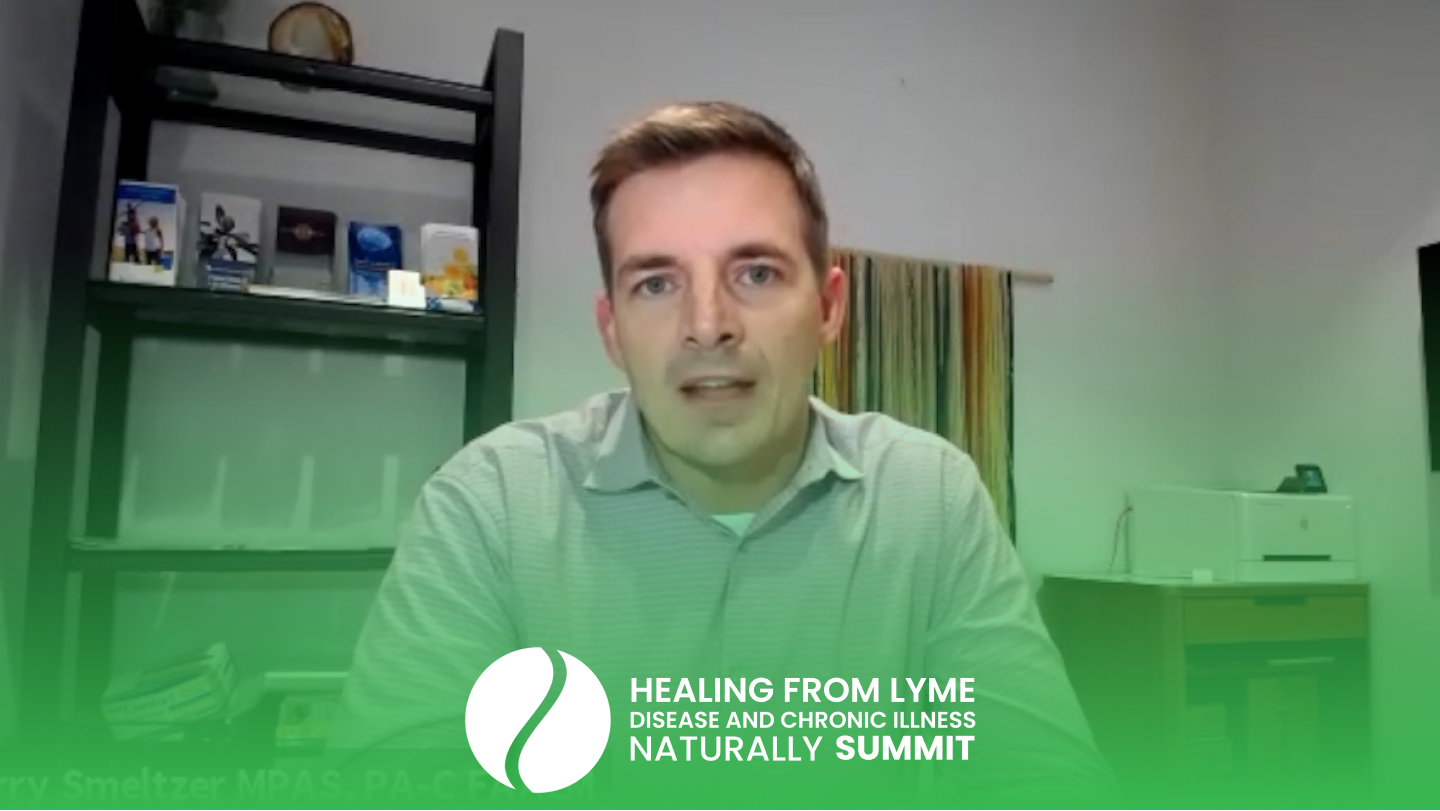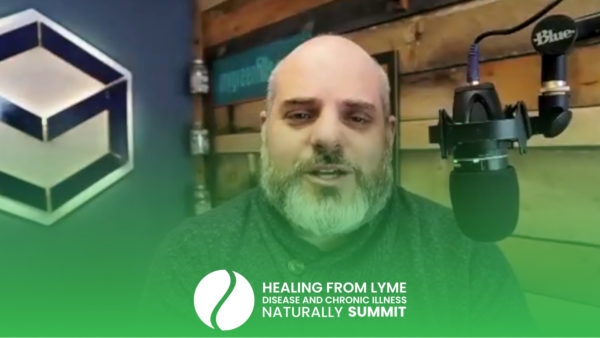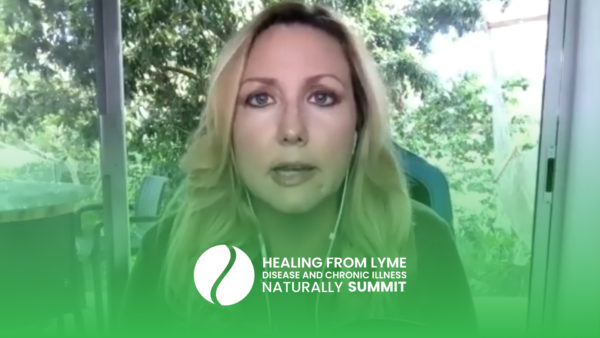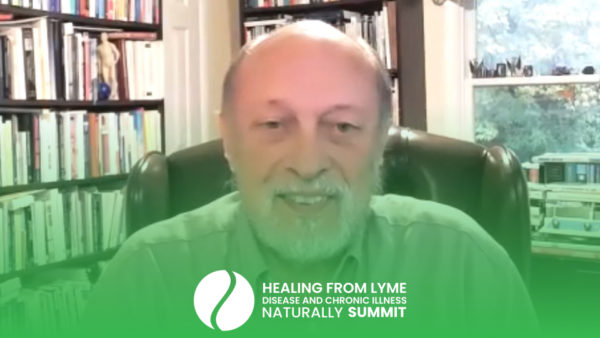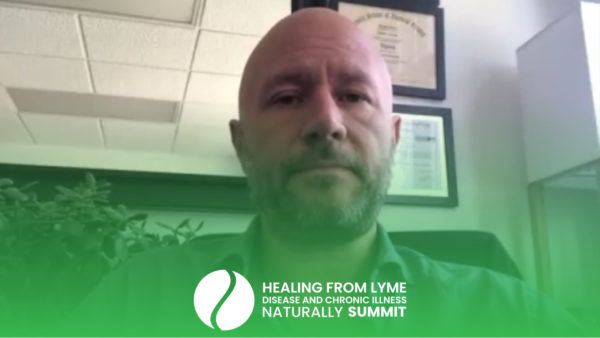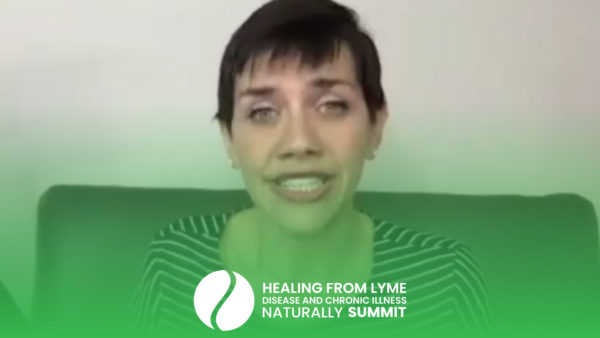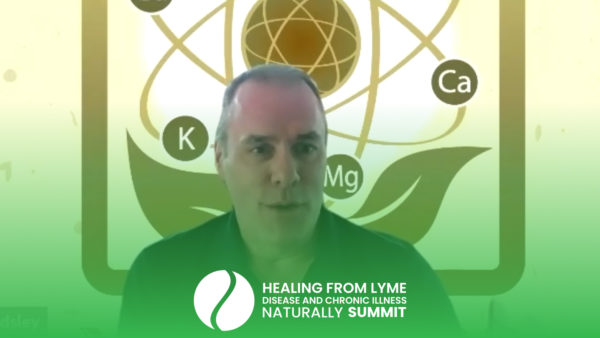Join the discussion below
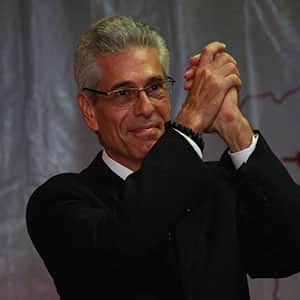
Rob Besner, PSc.D, Co-Founder and Chief Science Officer of Therasage, has always been an advocate of natural health and wellness. Graduating from Boston University in Pre-Med, Engineering, Psychology and Business, he continued onto post graduate work at Case Western Medical School and Holistic Medicine After many years of illness, Mr.... Read More
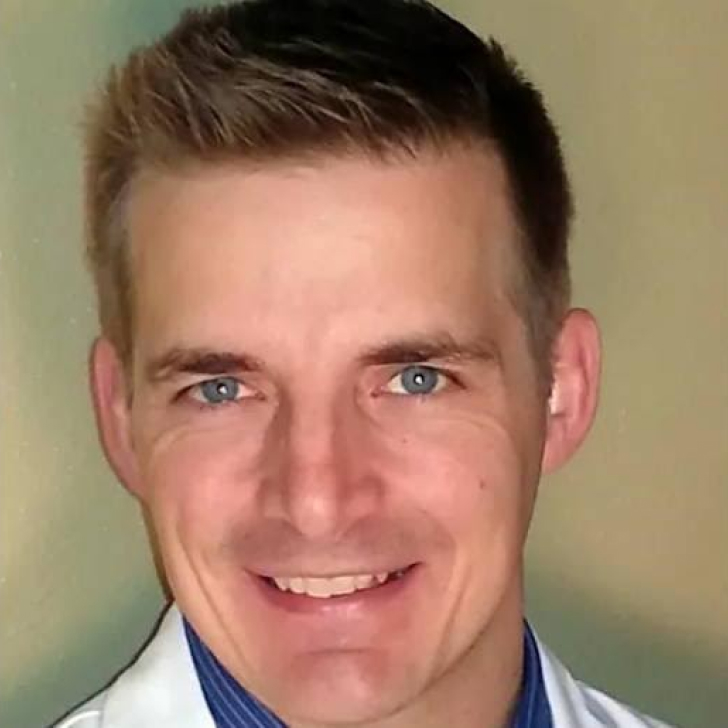
Barry Smeltzer is a Holistic Practitioner who specializes in biomedical and environmental medicine interventions to assist the body in the healing process. He has dedicated his career to healing children and families after his own son was diagnosed with multiple medical conditions, from which all he has significantly improved. Read More
- Is it Lyme or something else preventing you from getting better?
- The effects of stress on infections. Education and the family dynamic.
- Sweating, movement, and detox.
Related Topics
Chronic IllnessRobby Besner PSc.D.
Hey, everybody, it’s Robby Besner back with an amazing episode. You guys know me, I’m the co-founder and device developer for Therasage, and today we have the episode of all episodes. Dr. Barry Smeltzer is with us, and I know Barry personally had his family and I had the pleasure of actually being in, out overseas in Beijing with him at an amazing conference. But we met at an autism conference in Chicago, I think so. I think it was Chicago a bunch of years ago. He’s a family practitioner, he focuses on family, he has an amazing family himself, and if he keeps going, he’s going to have a football team.
So, as far as I know, I think he’s just under a basketball team of kids, but his practice is very family and kid oriented. And even though his main focus and how I met him wasn’t at an autism conference and he gets on stage and he talks to a lot of colleagues and high-end practitioners. And he knows his way around that turf. There’s a strong parallel between the autistic family dynamic and children and people on the spectrum and the Lyme family dynamic and of course my patients that are on the full spectrum of could be debilitated all the way to functioning and, and having episodes every so often. And so, because he dives really deep into his own medical practice and his own journey, I want to bring Dr. Smeltzer on, Dr. Barry you you ‘ll call him for today. And Barry, give us a little bit of a backdrop on you. What you brought, brought you to where you are, and then let’s dive into a little bit of the pearls that we can offer to the Lyme community.
Barry Smeltzer, MPAS, PA-C
Well, thank you so much, Robby. Yes, We’ve been pals for a good long while, and it’s been a wonderful relationship that has evolved over time. One area though, that we have to discuss real quick. It’s not a big deal and I get called Dr. Barry a lot, but actually physician assistant. So, they are on there and you can call me that but I never, I never claim ever, ever, ever to be a doctor, but I get that all the time. So, it’s not a problem, I don’t have any problem with it. The, yeah my main owner operator of Healing Provisions here in Austin and San Antonio.
And yes, my background is definitely in Lyme, have a personal experience with my son, but the biggest part of what our practice has evolved into, is that no longer is it a disability that these kids we dealing with and the same thing with the debilitating disease that Lyme is. And what has happened over these last 10 years of dealing with so many of these families and trying to assist them in that healing journey hence why I called my practice Healing Provisions, not managed provisions, is that we really wanted to focus on getting beyond just managed care. That’s kind of the whole purpose of this type of treatment.
And this type of medicine, is that it goes way beyond just treating your sickness. It goes to how do we get your body into a state that it actually can start healing again. And that encompasses so much of what you do Robby in regards to all the different aspects of healing, not just the detoxification, which is where Therasage is just makes such a huge difference. What I do is I start getting into so much more in the history because even with something as difficult to address as Lyme, Lyme doesn’t necessarily cause that kind of a problem in every patient, and so much of what creates this chronic debilitating or just very very frustrating type of situation when it comes to Lyme, has so much to do with what else is going on in not only the body, but in that family or in that situation, that is either helping or inhibiting their ability to heal.
So, that’s where looking beyond the disease itself and into so many of these different aspects, and that gets more into the environmental medicine side of me. And that’s why I’m so proud to be a fellow of the American Academy of Environmental Medicine because they truly are what actually mean to understanding that everything affects everything. So, you can’t just look at the physical symptoms.
You can’t just look at the numbers at what they’re telling you. You really have to look at why is it that this patient is seeming to get a little better than worse or getting to where they’re doing better, but then all of a sudden, you know seasonally, they seem to do worse. What is that? Is that a relapsing form of Lyme, or is it possibly, they have allergies that no one’s ever looked at? Is it because they have a critically, you know, immune deficient because of Lyme? Or is it that they have four other different types of viral infections that no one’s looking at because they’re simply concentrating on the Borrelia , along with the so-called co-infections of all the different tick-borne diseases. So, there’s so many other areas that may not directly be connected to Lyme, but really kind of other wild cards on how to then get them over that hump to go from managed sickness, to healing and actual wellness.
Robby Besner PSc.D.
Wow, That’s so powerful. You know, I’m really glad that you brought up that whole environmental piece because for those of you that just tuned in, Barry is basically talking about the environmental influences and in a more modern language, they kind of call about the speak to the epigenetics. So, how is our environment and the things that we breathe, eat, you know, drink, are all these environmental influences affecting our disposition, or symptoms or actually in some cases our genetics? So, it could be bringing out genetic proclivities or tendencies that we may never have seen before and absent the toxic environment or in these days.
And now speaking to the Lyme community, you’ve got this toxic environment, the epigenetics that are shifting, and you’ve got an imbalance, that’s all of this has created in your internal environment, your microbiome that’s making you symptomatic. And so yes, Lyme is there. The co-infections are there, but it really what we need to speak to, what you’re talking about is the imbalance that’s being created. and of course the environmental influences that could be suppressing your immune system, allowing that imbalance to occur. So, focus on the terrain, focus on the things creating that healthy platform by which your body can thrive, right?
Barry Smeltzer, MPAS, PA-C
Yeah, that’s exactly what environmental medicine is based upon, that all everything affects everything, goes to what we really focus on, which is total burden or total load that everybody, has a certain ability to handle things around us. And you spoke to really great piece in regards to what we eat, drink and breathe. And that absorption piece of we may be thinking we’re eating something that’s giving us a thousand calories that we need, right? But if you aren’t absorbing 400 of those thousand, you have 400 calories going in the toilet. You’re only netting 60% of your energy and that’s an absorption problem.
And then you go beyond that, and that gets into the whole microbiome medicine. But the other thing too Robby that is also a big part of this, that is a very unknown factor that fills that same bucket in regards to burden, is stress. And if 2020 has taught us anything, is that when you are stressed, you are less able to fight infection. And I find that telling people not to stress, is one of the worst ways to get them to distress. And one of the things that’s been most powerful ability to distress is education. It’s starting to give them the details, starting to talk to them about all these different possibilities that are things that maybe either haven’t been looked at at all, or just haven’t been evaluated to any degree and saying those could connect to what is creating the symptoms that you are so desperately wanting answers to.
We start identifying some of those working with our patients, becoming that kind of partners in crime, you know, investigating. And what it really does is it brings that positive outlook because everyone is basically said you’re hopeless, hopeless, hopeless, we tell them five or six different ways that no one’s even looked at. So that hope starts to creep back in positivity in and believe it or not, you know this, but that’s the treatment.
Robby Besner PSc.D.
Oh my goodness, yeah.
Barry Smeltzer, MPAS, PA-C
And that is powerful treatment is no different why people of faith tend to heal better. They always have that, “No, I know that I’m going to be okay.” And those two areas alone, just educating them on, there’s a possibility of all these other things you just brought up, and then actually evaluating how much they’re actually absorbing cause we always talk about, you know, with Lyme in general, fatigue is a massive issue, and we always blame the disease. But what if the disease was simply a part that was draining that bucket a little bit, but you weren’t filling it, but 50% full, now you’re at 40% because of the 10% that, that the actual disease and you’re blaming it on that, When in actuality yes, you’re no years no way you’re healing when you’re only getting 50% of what you’re eating.
Robby Besner PSc.D.
All right, that’s a good point. Nutritional absorption, potentiating nutrition into the body is so important like I see it because people, you know, I’ve got pill fatigue and so basically recently I’ve kind of shifted most of myself fermentation into a liquid format because it’s more easily absorbable, or I look for formulations that are not just the right kind of supplement, but also that are energetically balanced for my body. So that, you’re talking the same language, apples and apples, you know, and many of the synthetic supplements and medications that are available, you know, they look the same on under a microscope, but they don’t act the same the way the body receives them.
And that can make the difference between sort of a moderate result or absorption or an optimal result and absorption. And so, I think that that’s sort of key, but you know, I love this topic about stress, and I really want like here I am, I’m so stressed out. I’m in sympathetic dominance. I’m at the end of the end of my rope or at the edge of my chair. And I’m very anxious and certainly COVID has dialed that up quite a bit being confined and so, what kind of things do you recommend to your, you know in your practice to patients to sort of simple ways to just sort of distress? What would you recommend?
Barry Smeltzer, MPAS, PA-C
First thing we do, it sounds kind of, you would think well, doesn’t make much sense, but we actually dig into empowerment. And get out of, this is something that’s happening to me and all, you know, man, I just, you know, I don’t know what to do because when you don’t have control, you have no power. And when we start to investigate this and we give them like, hey we’re gonna start to get somewhere with this. And we’re gonna start to do the type of investigation that unravels some of this thousand piece puzzle that you have no picture to try and put together. And we’re saying Hey, we’re gonna start putting that picture up a little bit.
So, It’s still complex, but man, we’ve got a fighting chance to actually put it together, that I found by far, especially and especially with the moms that I deal with, not deal with it that have the pleasure of actually being a part of their journey because women and men, we are Mars and Venus. Men we definitely are much more on the results say, “Hey, I don’t care how you get me better, “Barry just get me better.” But the moms especially, but women in general, they don’t just want to get better. They want to know why they’re getting better.
They want to know if this is something that could happen again down the road. They want to know if this could affect their children. Could it affect their grandchildren? Could this be something that gets into their community and they need to be able to understand all of that because they are the caretakers. And I love that difference because then we can focus on things more because we’re not burdened with all of it, but they’re the glue that holds that all together. That gets back to your idea, family dynamic and that education piece, knowing the difference between the two, you don’t waste time on one and you make sure you educate and they understand on the other.
And that really brings a little bit more of that confidence, which in turn turns into, they trust their intuition again. And the, I have literally seen that the stress levels just melt as we start getting into understanding what was going on in the first place. So, that’s kind of the first most powerful. The second is I really encourage my patients in multiple ways to gain movement in their day, you know, when go to the gym. I’m a huge fan of nature therapy as are you, you get the beach lucky guys, I get the forest. So, I can go into and go on a hike, that quiet takes you out of that autonomic dopamine driven fight or flight and breathing that oxygen is a big deal and it actually forces your body to regulate itself.
So, that’s another strategy is just getting movement. And then the sweating and movement, just gets your lymphatics going, it gets your detox way going better, it actually gets you sweating, which is a huge organ for detoxification. And it gets you going to the bathroom more often because that motility and getting rid of toxins, is how you get rid of all the things that you’re trying to deal with with Lyme in the first place. So, that’s a physical benefit in addition to the psychological and mental and spiritual benefits. And that’s kind of environmental medicine in a nutshell, is we never do it for one reason. We always understand that you, if you do this to help the physical, you’ve got the psychological and emotional benefits of it that allows it to even be more powerful from a physical standpoint.
Robby Besner PSc.D.
Wow, great, great stuff. You know, movement is kind of interesting because you know, when you’re, when you have an episode of Lyme, and sometimes you’re just on flat on your back, you have no energy and you know, it could be a week or two at a time in having a reaction on an episode, it’s hard to think, or even imagine, you know, what is the light at the end of the tunnel. But when you’re talking about movement, it’s interesting to me because movement can be defined a lot of ways. I mean, you could put on some kind of energetic kind of music and sort of dance around the house. You can get a little rebounder trampoline and bounce around for five minutes, or if you’ve got family members, sort of fool around with them and, you know, play board games that involve movement to them. So, you don’t, it doesn’t mean running to the gym and workout.
Barry Smeltzer, MPAS, PA-C
Exactly.
Robby Besner PSc.D.
Yeah you can just start sort of simple and slow. That’s I mean how great it is,
Barry Smeltzer, MPAS, PA-C
Stretching, you know, just getting the body into a place that it’s actually able to, cause that tension just puts you into even more of that anxiety and that fight or flight. And it’s just, it’s such a powerful part of healing. And when you are living in a state of kind of that perpetual unknown, you have to do everything you can to keep out of falling down that deep, you know, kind of dark place because it’s not because then you do cause how many people who are dealing with chronic Lyme end up being put on some type of psychological psychiatric medication, not because it treats their Lyme at all because they just can’t cope. And it’s being perpetuated in the medical community because they’re basically saying, well, since we can’t figure you out, you’re crazy. You know, it’s just, it’s a frustrating thing that I hear from so many of the families that I see, not just from a Lyme perspective, but even autism and just chronic disease in general.
Robby Besner PSc.D.
Right, yeah. I can tell you the numbers and it’s just been not alarming numbers of customers and patients that we have talked to that have been at a place where the doctor or the practitioner had gone to can’t find what’s going on with them. So, they say to them, “You’re crazy, this isn’t physical, “this is, you know, definitely a mental, “so, go see a psychiatrist,” And the patient knows, the person knows that they’re off. They know that they’re not feeling well. And so, I don’t know there’s, you know that synapse or that gap between Lyme literacy and practitioners that really are asking the right questions so that they actually can guide the patient the right way. And so, I think a big lesson, a big pearl from this discussion is, start to listen to that voice inside of you.
You’re not crazy. And if you surrounded with a family members that are as scared as you are about this, don’t thrive on their negativity, Like the negative Nancys out there, like sort of set aside those toxic relationships and focus on the will to live, which you mentioned earlier, is such an important component to a healing in general. And even your reference to religion or spirituality, it’s okay to have a connection to your higher powers, to your ancestors in that way. And those are those voices that speak to you that give you guidance. And so often we forget to listen. I mean, you know, I went through that myself. I started having voices in my head as early as eight or nine, but ignored them till my mid thirties and then I started to realize that when I’d asked the question, should I go left or right. And my voice said go right, but I went left just because I am who I am.
The voice was always right. That intuitive. So, as great as a practitioner, as you are, I can be and even some of the other all-stars that we are bringing on through this Lyme campaign. The best doctor on the planet, is the one that’s inside of us. So, wow, and then you talked a little bit about the victim mentality. Like yeah, you have a mind and you have things going on. We know that, but you have the power to actually make that change and make that shift.
Barry Smeltzer, MPAS, PA-C
Just one second though, because I think what I don’t want anyone to feel, is that I’m judging anyone that is dealing with a chronic debilitating disease. This is real. It is absolutely real. The pain is real, the desperation is real. I don’t want anyone to think that oh, they’re just, just, you know, trying to get away with things. That is not the case whatsoever. It is simply having that hope and not letting Lyme become who you are. Fight that narrative, that everyone while you’re a Lyme person or, or your chronic fatigue person, because they don’t believe in Lyme, or you have fibromyalgia because they don’t believe that you have anything real. I want people, that’s the victim mentality.
I don’t want people to fall into it. I don’t feel that way. I feel everything that they’re doing and everything they’re feeling and dealing with is real, but been investigated, in a way that I do a lot of analogies to cars and tell them that, you know, when you go and you have a disease where you can’t think right and you loose your fatigue, and you go to the doctor that that is supposed to be checking you and it’s like going to the mechanic, but all they do is I’m a battery mechanic, that’s all I do, and he lifts the hood, looks at the battery, he says, “Well, it might be something wrong,” and fixes the battery and it shuts the hood and you don’t start. Then they look at you and say, “Well, you have no start disease” and they don’t check anything else.
Robby Besner PSc.D.
That’s not my job. Right exactly.
Barry Smeltzer, MPAS, PA-C
In a car scenario, we would be like, that’s ridiculous. But you knew a neurologist or you can go to a psychiatrist or you would go to a general practitioner. And a lot of times they will go based upon that one symptom, investigate that one symptom and then basically say, “Well, you, you get new car start disease.”
Robby Besner PSc.D.
Right.
Barry Smeltzer, MPAS, PA-C
And that is just so disheartening and so crushing to the morality of a person, you know, like, they’re basically told that you’re on your own.
Robby Besner PSc.D.
Yeah,
Barry Smeltzer, MPAS, PA-C
Then you have family members who don’t know what to do. So, they’re just trying to cope. So, they’re like, “Well you’re a Lyme person, so you’re just one of those “and you feel crazy.”
Robby Besner PSc.D.
Right.
Barry Smeltzer, MPAS, PA-C
I don’t want people feeling much more on the opposite of, I know that this is real and I am waiting and hoping and dealing and trying to fight to have people who understand that all of the balls that need to be juggling at all times to understand, to put those pieces into a puzzle. That actually has a picture. So, I’m sorry. That’s I just want to make sure that was…
Robby Besner PSc.D.
No, no no I got that. I’m really glad that you clarified that because you know, it is easy to get shut down and shut out. And as it is, you’re not feeling well. And probably not thinking that clearly anyway, but when you’ve got someone that’s supposed to know what they’re doing, telling you that you’re crazy, or, you know, or isn’t, they aren’t really addressing you and your personal needs, then it’s either it’s time to find someone that will listen to you and don’t stop until you do. That’s some really powerful advice.
Barry Smeltzer, MPAS, PA-C
Especially getting in need.
Robby Besner PSc.D.
Yeah, well, Barry this is amazing. We only have a few minutes left and you’ve really told us so many things that are important, foundational primal things that are important. I should’ve started with this. If you want to get ahold of Barry, you can go to his website, but we’re going to have a banner anyway, which is www.healingprovisions.net. It’s not.org and.com it’s .net. Or you can write an email to his group, which would be [email protected]. So, you know, Barry Smeltzer and his practice, they are heart centered, and they do amazing work. And he’s really someone to check out, all you guys out there if you’re interested to know more. So, before we finish up, it’s a strange time with COVID now, we’re sort of seeing a little more light at the end of the tunnel, there are a few more things that you want to share with the Lyme community that might give them inspiration and or give them a little bit more direction before we gone today.
Barry Smeltzer, MPAS, PA-C
It’s a scary time for people. And I don’t necessarily mean because of, of what the virus is bringing, but more of what the loss of freedoms are. And people need to know is that during this time, try to make sure that you keep your own, your own thought processes, your own ideas, don’t lose sight and get caught up in a lot of what’s going on right now, because there’s so much noise that it really overwhelms even my system many times. And if I wasn’t in this all the time, it’s I could see how I could really live in a very fearful state. And I’m a big believer in education, I’m a big believer in empowerment.
I really want people to say, okay, let’s logically look into these things. And in the in the context of what we’re dealing with, how much does this affect what we’re dealing with and how much does it not? And when you start to kind of approach it that way, you can put it where it should be. And that’s in the context of kind of everything else you’re already dealing with both from a personal standpoint, but also as kind of a community, that I tell my families that, you know, we’d done so much to prepare from a standpoint of, you know, healthy living, immune support, reducing toxic exposure, reducing, you know, stress exposure. I can’t say, “Hey man, when we were prepping for COVID “for a long time.”
Robby Besner PSc.D.
Right.
Barry Smeltzer, MPAS, PA-C
And that really is comforting to so many of our families because they then feel like they already have a defense up and it’s more so just, okay, let’s just navigate with everything else that’s going on, we don’t have to put fear in the front. what would be my hope for everybody, is that trust your immune system when it comes to this, I know that when it comes to you really don’t feel that way when it comes to you’re dealing with a chronic illness, but there’s so much more to this than simply that one piece. And then if we can start to understand those other areas, your body is naturally made to address these issues. We just have to get out of its way in many ways.
Robby Besner PSc.D.
Wow, so powerful. Barry thank you for taking out the time to share your knowledge and your wisdom with all of us. I know that there’s plenty of pearls and there’ll be shown notes here so people will be able to pick and choose the highlights and the time in this interview to tune in. Barry Smeltzer healingprovisions.net. You’re awesome, thank you for joining us today. Thank you for your contribution to community, your heart-centered position about things and just giving all of us out there.
A whole bunch of hope, because we do have an innate ability to heal or deliver our higher powers, they gave us all of those instructions. The body’s got memory. We just have to kind of scale it back a little bit, get rid of some of the toxic relationships, you know, take inventory, take this opportunity to cull through some of the things we liked and didn’t like in the past, and then step forward with a healthy, a healthier attitude. So, Barry, thank you again, best to you and your family and your practice and all the things that you’re doing.
Barry Smeltzer, MPAS, PA-C
Thank you so much, Robby for the opportunity. This is such an important topic with families that truly deserve everything we’ve got and we all have to get better. I think that from a determination, perseverance type of a community, Lyme is simply a word and families that come into this, It’s just like the autism community. I don’t like even talking about Lyme or talking about autism because to me there’s so many other factors that can be benefited, but the relationships that I have gotten from that, that community I’m sure translates into so many of the families that are in the Lyme community and you gain the family you never thought you would gain. So, yes it’s a terrible diseases debilitating, but the journey doesn’t have to be negative. I think it can be a really positive experience.
Robby Besner PSc.D.
Wow, thanks again. Hey everybody, it’s Robby Besner, thanks so much for joining us today. Please share this content with anyone that you think might benefit from it, and we’re looking forward to having you with us tomorrow for another great interview.
Downloads

